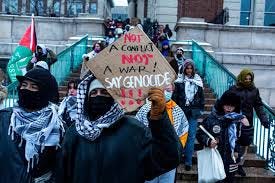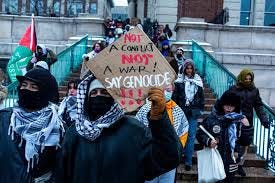Presidents, Policies, and Prosecutors
Under Pam Bondi, the Justice Department is charting new policy directions. One is its determination to root out anti-semitism from the United States. Step one investigates universities.
Justice Briefs is a weekly newsletter devoted to federal criminal prosecution. The federal government’s evolution over the last 230 years has given federal prosecutors significant discretion. Few realize it exists and even fewer know how it is used. Justice Briefs aims to make federal prosecutions and prosecutors more accessible to the general public. Please help me in this endeavor by subscribing and sharing with others.
Justice in Brief
In the Northern District of New York, four men were indicted for their part in a conspiracy that brought people into the United States across the Canadian border with New York.
In the District of Hawaii, two men were charged with defrauding the Veteran’s Administration of more than $9.1 million by falsely representing that their massage therapy training school was in compliance with VA regulations when, in fact, it was not.
In the southwest border districts, the United States Attorney’s Offices charged more than 990 illegal aliens with offenses during the last week in April. Most were illegal re-entry cases.
Updates…
In the District of Arizona yet another person was indicted for starting a fire at a Tesla dealership that damaged a car and the building.
In the District of South Carolina, Bryan Stirling was appointed United States Attorney. When appointed, Stirling ran South Carolina’s Department of Corrections. Previously, he served as Deputy Attorney General for South Carolina and as Chief of Staff for Governor Nikki Haley.
The Anti-Semitism Task Force
When a new President takes office, policy changes follow. Usually these changes occur slowly. Sometimes they occur more rapidly. The last several months have seen significant policy change in the federal government generally and in the Justice Department specifically. In the past few weeks, the Justice Department’s Civil Rights Division has experienced significant change in terms of personnel and policy. This has resulted from a distinct change in the Division’s approach to Civil Rights. Assistant Attorney General Harmeet Dhillon outlined her agenda as combating antisemitism, ending transgender rights, removing anti-Christian bias, and eliminating “woke” ideology. The shift, coupled with the government’s severance package for those who resign, has led to nearly 200 resignations within the Civil Rights Division. The one section within the Civil Rights Division that has not experienced significant personnel reduction is the Criminal Section. That Section handled hate crimes and human trafficking.
One aspect of the policy change at the Civil Rights Division is the formation of an antisemitism task force. This was announced in early February in response to President Trump’s Executive Order. The Order stated, “It shall be the policy of the United States to combat anti-Semitism vigorously, using all available and appropriate legal tools, to prosecute, remove, or otherwise hold to account the perpetrators of unlawful anti-Semitic harassment and violence.” The following section instructs particular attention be given to college campuses. The rationale for this, according to the Order, is the increase in antisemitic violence at college campuses following the October 7, 2023 attacks in Israel. The new task force’s first priority, therefore, would focus on college campuses. It would draw upon resources from the Departments of Health and Human Services and the Department of Education to carry out its mission.
Assistant Attorney General Leo Terrell assumed the Task Force’s leadership. Prior to his appointment in 2025, Terrell worked as a civil rights attorney and radio talk show host. He also appeared on a number of podcasts. Initially, he provided the liberal perspective countering his colleague’s conservative perspective. Over time, Terrell’s views changed. The NAACP rejected Terrell’s legal services when he supported a George W. Bush appointee for the 9th Circuit Court of Appeals. Terrell’s transition to the conservative perspective completed when he supported President Trump in the 2020 election. Terrell made news recently when he shared a social media post authored by Patrick Casey, the former leader of the American Identity Movement, a neo-Nazil, white supremacist organization according to the Anti-Defamation League. Casey’s post shared President Trump’s comments that Senate Minority Leader Chuck Schumer is no long a Jew but has become Palestinian. According to Casey, President Trump could revoke someone’s “Jew card.” Despite this, Terrell announced he was committed to rooting our antisemitism on college campuses. He promised indictments were forthcoming soon and that the offenders would receive significant prison time. “You see all these disorderly demonstrations, supporting Hamas and trying to intimidate Jews? We are going to put these people in jail—not for 24 hours, but for years.”
One of the Task Force’s first actions was to visit ten different universities where allegations were made that the universities failed to protect the Jewish population from unlawful discrimination. The schools visited included George Washington University, Johns Hopkins, New York University, Northwestern, UCLA, USC, University of California-Berkeley, University of Minnesota, Harvard, and Columbia. The group intended to meet with University leadership and affected students and faculty. After these meetings, the Task Force determined whether “remedial” actions were necessary. In the case of Harvard and Columbia, at least, the remedial action was to revoke billions of dollars in federal grant money.
The task force has also attempted criminal investigations. The case of Columbia University exemplifies these efforts. In late January, several students disrupted the first day of a Modern Israel History course at Barnard College. Columbia followed its disciplinary procedures for two students that were identified. That process resulted in expulsions in late February. Following those expulsions, a collection of students sat outside the Dean’s office for more than six hours, demanding that the Dean meet with the protesters and reconsider the expulsion. As the protest stretched into the evening, negotiations ensued, and New York police were called to the scene. After the terms of a meeting with the Dean were agreed upon, the group dispersed and began a march down the street.
Following these events, the Justice Department’s Emil Bove ordered an investigation into Columbia University Apartheid Divest. The group is a coalition of organizations that advocate for a free Palestine and has led many of the pro-Palestinian protests at Columbia. Mahmoud Khalil, the Columbia graduate student arrested in March and detained pending deportation, is one of the group’s leaders. The investigation apparently created a conflict between the politically appointed Justice Department officials and the career civil rights prosecutors. Bove tasked the prosecutors with obtaining the group’s membership list. He then told them to obtain a search warrant for the group’s Instagram account as those posting on the account had made threats. When the prosecutors did this, a magistrate judge refused to sign the warrant, citing the lack of probable cause. Bove ordered the denial be appealed to a District Court judge. That judge requested the magistrate reconsider. The magistrate again denied the application. The magistrate judge also expressed concern that assistant US Attorneys from the Southern District of New York were not present. With these failures, the investigation has stopped.
These events highlight an important dynamic within the Justice Department that has emerged in the last fifty years. There are two distinct classes within the Department: the political appointees and the career prosecutors. While the political appointees come and go, the career prosecutors remain. They accumulate extensive experience and expertise in their specialized areas. In most instances, the career prosecutors will advise the political appointees. This effectively limits significant change between presidential administrations. From the standpoint of law enforcement, this is not a bad thing because it provides consistency in legal interpretation. For better or worse, the new Justice Department political appointees have chosen to make rapid change in the Department, revising how the Department handled cases. These changes have met with resistance from the career prosecutors. The political appointees have stepped in and forced the change. They are signing court documents themselves, appearing in court, and firing recalcitrant prosecutors. The full effect of this internal conflict remains to be seen. One measure will be whether any criminal prosecutions will result from the work of the antisemitism task force. Or, will the task force’s work be limited to gaining leverage over groups the Administration perceives as it adversary?
I hope you enjoyed this issue and that it made you stop and think. I would love to hear any comments, questions, concerns, or criticisms that you have. Leave a comment or send a message! Also, if you enjoyed this or if it challenged your thinking, please subscribe and share with others!




